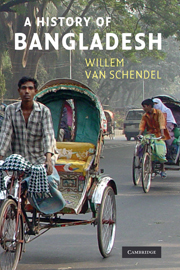Book contents
- Frontmatter
- Contents
- List of plates
- List of maps and figures
- Acknowledgements
- Timeline
- Introduction
- PART I THE LONG VIEW
- PART II COLONIAL ENCOUNTERS
- PART III BECOMING EAST PAKISTAN
- 11 The Pakistan experiment
- 12 Pakistan falls apart
- 13 East Pakistani livelihoods
- 14 The roots of aid dependence
- 15 A new elite and cultural renewal
- PART IV WAR AND THE BIRTH OF BANGLADESH
- PART V INDEPENDENT BANGLADESH
- Conclusion
- Bangladesh district maps
- Key political figures since 1947
- Glossary of Bengali terms
- Notes
- Bibliography
- Index
15 - A new elite and cultural renewal
Published online by Cambridge University Press: 05 February 2015
- Frontmatter
- Contents
- List of plates
- List of maps and figures
- Acknowledgements
- Timeline
- Introduction
- PART I THE LONG VIEW
- PART II COLONIAL ENCOUNTERS
- PART III BECOMING EAST PAKISTAN
- 11 The Pakistan experiment
- 12 Pakistan falls apart
- 13 East Pakistani livelihoods
- 14 The roots of aid dependence
- 15 A new elite and cultural renewal
- PART IV WAR AND THE BIRTH OF BANGLADESH
- PART V INDEPENDENT BANGLADESH
- Conclusion
- Bangladesh district maps
- Key political figures since 1947
- Glossary of Bengali terms
- Notes
- Bibliography
- Index
Summary
The Pakistan period was not only a time of political and economic struggle; it was also a time of crucial cultural change. After 1947 the inhabitants of the Bengal delta had a lot of rethinking to do. What did it mean to be a Bengali now that the old centre of Bengali culture, Kolkata (Calcutta), had become inaccessible and many Hindu professionals had left for India? This rethinking was most intense among a new group of professionals who began to come up in the larger towns and cities of the delta. Unlike their predecessors, who had been largely part of the old landowning gentry, or bhodrolok, these newcomers shared a lower- or middle-class background and usually came from villages or small delta towns. Taking advantage of new educational and job opportunities and educated entirely in Bengali, this provincial (mofussil; maphasval) elite developed a cultural style of its own. It differed consciously from the ways of the Kolkata-based urban professionals as well as from the cultural universe of the landholding gentry, not to speak of the ways of the new West Pakistani leaders. What set this emerging elite apart was that they were not bilingual (Bengali–English or Bengali–Urdu) and that their frame of reference was the Bengal delta, not the entire subcontinent or all of Pakistan. Their new cultural style was shaped by the very provincial Muslim sensibilities that the older elite groups had always looked down upon.
- Type
- Chapter
- Information
- A History of Bangladesh , pp. 152 - 158Publisher: Cambridge University PressPrint publication year: 2009



